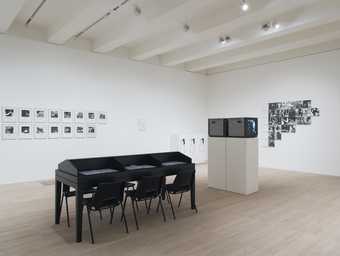When I came to London it was to study at Saint Martins School of Art because I had heard that this is where conceptualism was happening and the very next day, I think after I arrived, there was the largest demonstration ever against the War in this country. The streets were filled. The art schools were occupied and just hot on the heels of that was the beginning of the women’s movement. Everything was changing at the same time. We were trying to change our personal lives. First of all we started trying to live collectively. We thought different forms of family were possible. There were different ways of taking care of children.
You know, women weren’t taken seriously, you have to remember that. There were no women in Government. There were no women in teaching. I was the first woman to have an artist’s residency at Cambridge. I was the first woman to teach a course on Women in Art in Camberwell. Everything seemed to be a first.
One of the things that Post-Partum Document is about is the complex psychology of the mother/child relationship and how that underpins something like the social sexual division of labour. It was about subjectivity but it was very critically engaged with subjectivity. It would be something where you would pull the spectator in to this, kind of, diegetic space really, a very intimate space of reading where this narrative unfolds. The point about the woman and her relation to the child is of course of central and was unique and I couldn’t figure out why no-one had dealt with this and that there’s nothing but saccharin images of woman and children in art historically speaking.
A process like the lint which I developed at home doing something like washing and you’d hear the news on the television, and you’d be thinking about that while you were working and when I saw the material I thought that it just had the ephemeral quality that was necessary to try to tackle that problem visually. How to represent, kind of, war related atrocities that had to do with women and children in a work of art. It was seeing that things in the media, sort of, filter through into our everyday lives, like we’re not separate from the traumatic effects of that.
Exchanges with graduate students around their interest in the period of ‘68 was important for me in doing the piece called Love Songs that was in Documenta 12 and I only went back to look at that initially because the generation born at that time were asking me about it. It’s not just the events that took place but it’s what was thought and why does anything that’s passed on and how perhaps something like feminism informed by psychoanalysis has completely changed in the ways that it’s been used. You can see the relations between men and women are very different of a younger generation and that men are very involved, often without credit, in childcare. There’s certainly much greater expectation for women. Now you can’t say everywhere though. But for someone who’s been in teaching for 40 years, women are much, much better placed to fulfil their potential and that gives me hope.


